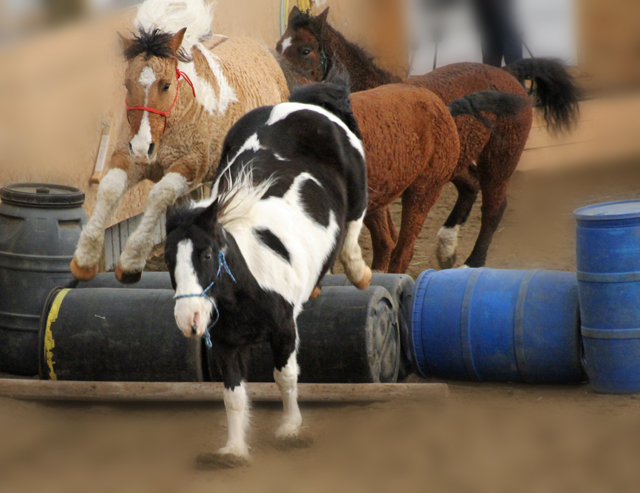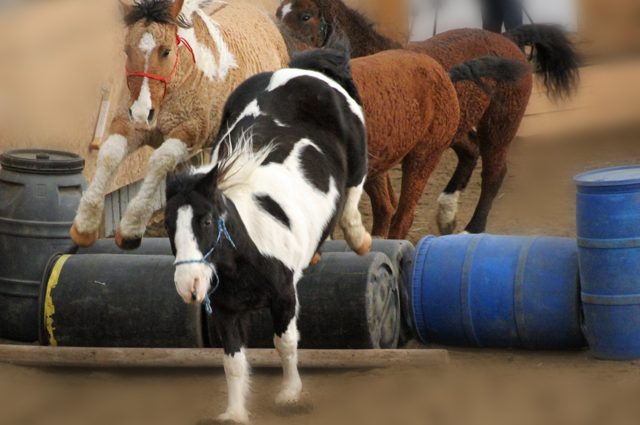
CFN – This Column of “Spirits in Unity” is being published by CFN for the community of Stormont, Dundas & Glengarry.
An emotionally fit horse and an emotionally fit you is a powerful combination and a great model for others. It is an expression of mastery. (Pat Parelli)
Your horse can only be as brave as you are. As his leader, your horse needs to be able to depend on you to be safe, he needs to trust and believe in you.
Dealing with horses is always a high risk adventure and that means fear is no stranger when we interact with these animals. This inherent fear leads to the expression of two different approaches in people.
Firstly – An over-controlling and domineering approach
Secondly – a reserved, unadventurous approach
Each of these approaches claims it share of victims, both horses and people because they are extremes and with each of these approaches failure is high.
The trick is to play it in the middle, not too controlling and not too reserved, but just right. It is about developing an attitude of partnership and dignity for the horse, keeping things positive, progressive and natural.
Fear has no place in the relationship with horses. It is our responsibility to teach the horse not to fear and to use training methods that do not involve intimidation, but are based upon communication, psychology and understanding.
For many of us we have become unconfident or fearful because of one or more horse-related accidents. It becomes important then to work on ourselves as much as on our horses.
Some people try to override their fear and do it anyway. This is a bad strategy because it only increases fear. You will become like a right brain introverted horse. You will hide the fear inside, until you can’t handle it anymore. You need to take charge of your own outcomes and knowledge if you are to gain confidence.
Here is a short little quiz to test how Emotionally Fit you are.
Don’t spend a lot of time thinking about it just go with your first thought. This has nothing to do with your personality, this is only about your behaviour.
Choose one of the following that describes your behaviour.
1. You are outgoing (extrovert) or you are more reserved (introvert)
2. You are unconfident (right-brain) or you are confident (left-brain)
Now fill in the blanks with the answers you selected to describe you behaviour around horses. My behaviour is like that of a (2) ____________ -Brain (1) ______________.
How Emotionally Fit are You?
Rate each of the following emotions from 1 (least) to 10 (most troubling):
– Fear
– Anger
– Self-Anger
– Frustration
– Anxiety
Choose from the following list how you feel when your horse gets emotional:
– Afraid
– Threatened
– Annoyed
– Sympathetic (feel sorry for him)
– Empathetic (understand what he feels)
– Frustrated
– Helpless
– Emotionally hurt
– Confused
– Centered (calm, focused on helping)
Strategies for Success
Getting control of how you feel about things is an important step in becoming more emotionally fit. There are physical and mental strategies you can use.
Mental Strategies
First you need to understand that a horse is a prey animal. He is programmed to be fearful. He is not consciously trying to frustrate or annoy you. He’s not even trying to scare you. He is just trying to survive.
When his survival is threatened and you are around, he is going to forget about you completely and try to save himself. If he perceives you as a threat, he will do whatever it takes to get away from you.
This is where it is critically important to develop a relationship of trust based on love, language and leadership. Your horse has to see you as his source of safety. Once you have developed this, his vulnerability to dangers decreases dramatically – so long as you are not scared, your horse will follow your lead.
Just as with any worthwhile relationship, it takes time to develop a relationship at this level and the relationship will be tested over and over again. It is something that you have to work on every day in every way by making sure that every time your horse shows a loss of confidence you address it as opposed to ignoring it and carrying on with what your are doing. That is how you put the relationship first – you take care of you horse’s needs first.
Here are some strategies to use when you feel these emotions.
Afraid – Retreat, get off NOW! And don’t get on again, or start again until you are no longer afraid and your horse is in a calm, thinking, confident frame of mind.
Threatened – Retreat, get behind a fence or somewhere your horse can’t reach you. Think about what to do next and get help if needed. I heard an interesting story last week about Tom Dorance, one of America’s most renown horsemen, who at the age of 94 was still starting mustangs and difficult horses. At that age he knew he could not move too quickly so he filled a 45 gallon barrel with water and used it as a shield to protect himself in case the horse threatened his safety. He knew the strategy in dealing with a threatened horse.
Annoyed – Say “How Interesting” This will help stop you from getting more forceful or reacting aggressively. It gives you a moment to start thinking and take the appropriate steps. One day while dealing with a large group of my young students in a class, I was becoming annoyed. One of my more advanced students knew of this strategy and noticing that I was getting close to losing it, she put her finger beside her nose and said to me “How interesting”. That was all I needed to diffuse the situation. We could then laugh about it and move on.
Sympathetic – (feel sorry for the horse) – Say, “I don’t blame you.” This turns sympathy into empathy and keeps you present. Feeling sympathetic does not help the horse.
Empathetic – (understand what the horse feels) – “You’re Alright” and then take steps to help the horse get calmer. Saying this to yourself or to the horse helps put you in a calm and effective state so you can keep moving towards a solution.
Frustrated – “I’m just out of knowledge, that’s all it is. I don’t know what to do, so I’m going to find out.” Be gentle on yourself. Frustration is simply a lack of knowledge and that can be easily remedied with study. It takes an attitude of lifelong self improvement.
Helpless – I need a leader – Abandon the situation and get help with the situation before it comes up again.
Emotionally Hurt – “He doesn’t have a frontal lobe. He’s a prey animal. He is not trying to hurt your feelings. He is not capable of thinking like that. Don’t apply human characteristics to nonhumans. Everything your horse does is out of self-preservation and is based on either fear or dominance. It is not about you. Although you can be the source of the problem.
Confused – “Confusion in not an emotion – I need more information” Confusion is uncertainty. It can make you feel frustrated, self-angered, fearful.
Self-Anger – It is none of my business what I think of myself. It seems strange that this would work, but it does. Say it over and over until your feeling has changed.
Physical Strategies
The best way to overcome fear is to know that you have alternatives and to know that you are in control. Feeling fear and doing it anyway only increases the fear over time, until finally you give up on your dreams with horses altogether.
Today’s column is a compilation of thoughts inspired by various writings, talks and presentations of Horse Masters Pat and Linda Parelli.
For all those people who give horses loving homes, and for all those kids who are wishing for that special partner, may all your dreams come true also.
Whether you are just a horse lover, have dreams of owning a horse someday, or already have one, I hope these columns will give you some insight into the true nature of these magnificent creatures. I hope you will find them both informative and inspirational.
Be part of your horse’s dreams, not his nightmares.
May all your dreams come true,
Garry “Horsetalker” Meek


this is somthing that is very good to know and i will have to remember.
Such wise words, applicable to humans and horses- becoming emotionally fit is vitally important to become all we can be and realize our potential, the more I see your work Garry, the more I appreciate the value of your teaching style.
First of all,am thankful to Geoggle Alert for this piece of information.Additionally,I need to appreciate the writer,Garry Meek,for his profound contribution on Emotional Fitness.Pl publish more of your observation and understanding on the subject.